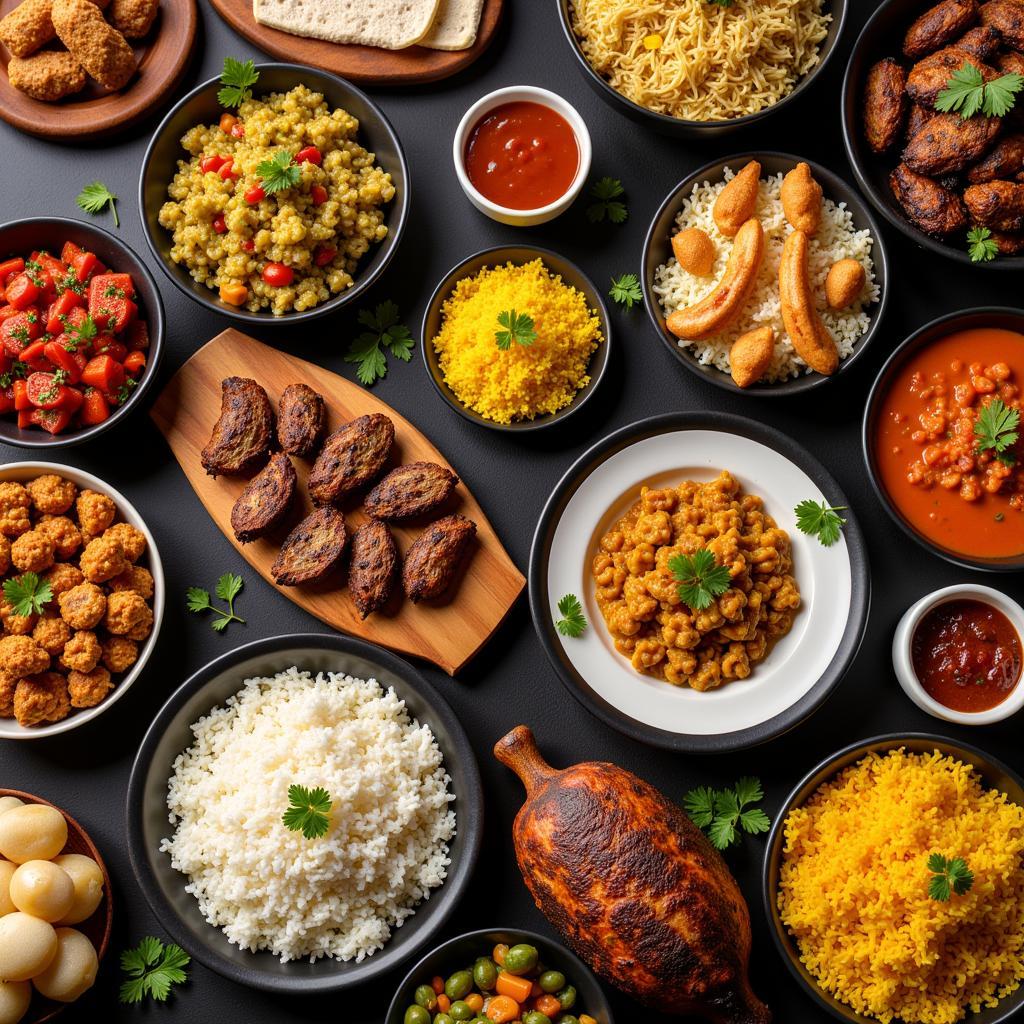Exploring the African Diet: A Journey Through Diverse Culinary Traditions
The African Diet is incredibly diverse, reflecting the continent’s vast geography and rich cultural heritage. From the bustling markets of Marrakech to the coastal villages of Senegal, each region boasts unique ingredients, cooking techniques, and culinary customs that have been passed down through generations. This article delves into the heart of African cuisine, exploring its regional variations, nutritional benefits, and its impact on global gastronomy. We’ll uncover the staples, the spices, and the stories behind the food that nourishes and defines a continent.
After centuries of adaptation and innovation, African cuisine encompasses a wide array of flavors and textures. It’s a culinary tapestry woven with indigenous ingredients, influences from trade routes, and the legacy of colonial encounters. This diversity is what makes exploring the African diet so fascinating. Think beyond the common misconceptions and discover a world of culinary possibilities. Learn more about incorporating this healthy eating plan into your lifestyle with the African diet plan.
Regional Variations of the African Diet
North Africa, with its proximity to the Mediterranean, showcases a cuisine rich in spices, olives, and citrus fruits. Tagines, couscous, and flavorful stews are staples of the region, often infused with aromatic herbs and spices like cumin, coriander, and saffron. Moving south, West African cuisine features hearty dishes like groundnut stews, jollof rice, and fufu, a starchy staple made from cassava, plantains, or yams. East Africa offers a blend of flavors influenced by Arabian, Indian, and indigenous Bantu cultures. Dishes like nyama choma (grilled meat), ugali (maize porridge), and flavorful curries are common throughout the region. Southern Africa, known for its abundant wildlife and fertile lands, features dishes like biltong (dried cured meat), potjiekos (slow-cooked stew), and braais (barbecues).
Staple Foods Across the Continent
Despite the regional variations, several staple foods form the foundation of many African diets. Cereals like millet, sorghum, and maize provide essential carbohydrates, while legumes such as beans, lentils, and cowpeas are rich sources of protein and fiber. Root crops like yams, cassava, and sweet potatoes are also widely consumed, offering vital nutrients and energy. Many African diets also incorporate a variety of fruits and vegetables, reflecting the continent’s rich biodiversity.
Nutritional Benefits of Traditional African Diets
Traditional African diets, often based on whole, unprocessed foods, offer a wealth of nutritional benefits. They are typically rich in fiber, which aids digestion and promotes gut health. The abundance of fruits and vegetables provides essential vitamins, minerals, and antioxidants. Lean protein sources like fish, poultry, and legumes contribute to muscle building and repair. Many traditional diets are naturally low in saturated fat and cholesterol, which can help reduce the risk of heart disease. Are you expecting and curious about maintaining a balanced diet? Explore the African diet during pregnancy for valuable insights.
Adapting the African Diet for Modern Lifestyles
While traditional African diets offer many health advantages, adapting them to modern lifestyles requires careful consideration. The increasing availability of processed foods and sugary drinks can pose a challenge to maintaining a healthy eating pattern. However, by focusing on whole grains, lean proteins, and plenty of fruits and vegetables, it’s possible to enjoy the benefits of an African-inspired diet while still accommodating modern conveniences. Are you interested in shedding some pounds while enjoying the flavors of Africa? Discover an effective African diet plan for losing weight.
The African Diet’s Global Influence
The African diet is increasingly influencing global culinary trends. Chefs and food enthusiasts around the world are embracing African ingredients and cooking techniques, incorporating them into innovative and exciting dishes. From the vibrant spices of North Africa to the hearty stews of West Africa, African cuisine is making its mark on the global culinary landscape. Explore the roots of African cuisine with insightful information on the African ancestral diet.
What are the core elements of a balanced African meal? A typical balanced African meal often includes a starchy staple, a protein source, and a variety of vegetables. This combination provides a good balance of carbohydrates, proteins, and essential nutrients.
Dr. Fatima Mohamud, a renowned nutritionist specializing in African cuisine, states, “The African diet is a testament to the continent’s rich biodiversity and culinary ingenuity. Its emphasis on whole, unprocessed foods offers valuable lessons for healthy eating worldwide.”
The African diet offers a rich and diverse culinary experience, reflecting the continent’s vast cultural heritage and unique ingredients. By embracing its principles of whole, unprocessed foods, we can learn valuable lessons about healthy eating and expand our culinary horizons. The African diet is more than just food; it’s a story of resilience, adaptation, and the celebration of life.
FAQ
- What are some common ingredients in African cuisine? Common ingredients include millet, sorghum, maize, beans, lentils, yams, cassava, plantains, and a variety of fruits and vegetables.
- Is the African diet healthy? Traditional African diets, based on whole, unprocessed foods, offer numerous health benefits, including high fiber content and essential nutrients.
- What are some popular African dishes? Popular dishes vary by region but include tagines, couscous, jollof rice, fufu, nyama choma, ugali, and potjiekos.
- How can I incorporate African cuisine into my diet? Start by exploring recipes from different regions and experimenting with African ingredients.
- Where can I find more information about the African diet? Numerous online resources and cookbooks offer detailed information about African cuisine and its regional variations. You might also find this interesting: African bullfrog eating chick.
- What is the significance of food in African culture? Food plays a central role in African culture, often associated with celebrations, rituals, and social gatherings.
- How has the African diet evolved over time? The African diet has evolved through trade, migration, and cultural exchange, incorporating influences from various parts of the world.
Common Scenarios and Questions
Scenario: You’re planning a themed dinner party and want to explore African cuisine.
Question: What are some easy-to-make African dishes that would be suitable for a dinner party?
Scenario: You’re interested in improving your diet and are curious about the health benefits of African cuisine.
Question: What are the nutritional advantages of incorporating African staples into my daily meals?
Scenario: You’re traveling to Africa and want to experience the local cuisine.
Question: What are some must-try dishes and food experiences in different African countries?
Further Exploration
Explore other related articles on our website to delve deeper into specific aspects of African cuisine and culture. Discover the diverse culinary traditions of each region, learn about traditional cooking techniques, and find inspiring recipes to try at home.
For any assistance, feel free to contact us.
Phone: +255768904061
Email: [email protected]
Address: Mbarali DC Mawindi, Kangaga, Tanzania.
We have a 24/7 customer service team.


